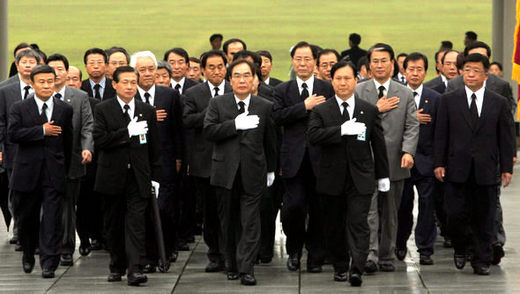 |
Opposition Grand Nationals pledge to block debate
Since new parliamentary speaker Lim Chae-jung’s inaugural address, in which he suggested amending the constitution, momentum has been mounting for such a move. The call for a change to the political landscape through a constitutional amendment has been an agenda issue for many in South Korea’s reformist political parties for years, a call that gained popularity in the wake of the ruling Uri Party’s crushing defeat by main opposition Grand National Party (GNP) in the May 31 local-level elections. Lee Sang-yeol, spokesman for the minor opposition Democratic Liberty Party (DLP), said in a briefing, "Now is the right time for us to consider the possibility of a constitutional amendment designed to change the nation’s political power structure."The changes would encompass an attempt to match up election cycles for different bodies of government, as legislative and presidential terms expire every four and five years, respectively. This lack of overlap, critics say, inhibits any ability for politicians or the president to effect any real change. Additionally, critics level that South Korea’s single-term presidency also has the same effect. Parliamentary speaker Lim continued his inaugural address by calling for the establishment of a research body in the National Assembly to explore the constitutional changes. Political watchers are awaiting an official stance on the issue from Goh Kun, former prime minister and one of the major possibilities for presidential candidate in the next election. Minister Goh had commented on the mismatched terms of office, suggesting he would support the constitutional amendment. The GNP has objected to such revisions, saying that they will not endorse debate on the issue during the current administration, whose tenure ends next year. Without an endorsement from the main opposition party, it would be impossible to push through the constitutional amendment, as the GNP holds 124 seats in the 297-member parliament. The Uri Party holds 142 seats, while the DLP has nine seats. At a time when the ruling Uri Party is suffering an all-time low approval rating, observers doubt that it will see any of its efforts on the amendment issue come to fruition. Another obstacle reform parties face is that any changes would have to be be finalized before March or April next year, when each party is expected to begin focusing on the primaries for the presidential election later that year. Critics level that, even though the amendment is unlikely to be pushed through, the Uri Party is pressing the issue because it is at an all-time low approval rating, and stands to lose even more ground in the presidential election. Experts note that even though chances are slim for the change, the argument itself carries significance in that each politician is being compelled to express a stance on the issue, which may in the process prompt a realignment of political alliances. Additionally, some lawmakers said the debate might touch off a full-blown examination of the nation’s political power structure.





